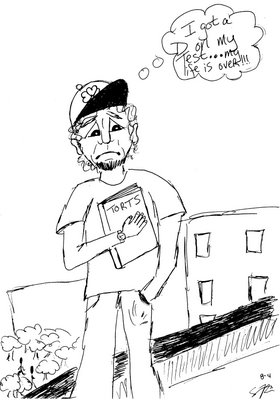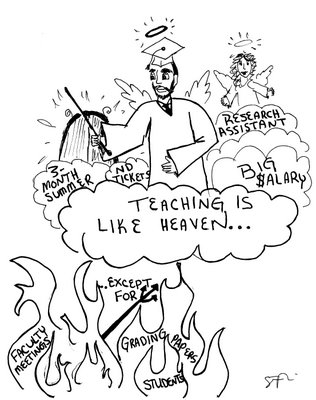Week Eleven, Part 5 - CivPro: Let’s Party
We have a party on Wednesday in Civil Procedure, although the class doesn’t begin that way. Professor Joseph Bauer starts the hour by reviewing subject matter jurisdiction. For our purposes, this doctrine concerns a federal court's ability to hear a case on a specific subject.
We first look at cases which raise a federal question, that is, there's “a dimension of Constitutional law to the claim.” For example, Bauer says, the plaintiff alleges his 14th Amendment right to due process was violated.
The second type of case in federal court arises via diversity jurisdiction. "DJ" occurs if the parties come from different states and the amount in controversy exceeds $50,000.
Bauer asks, “Now suppose A is from Indiana and B is from New York. A has two claims in her complaint. Count One is for $30,000; Count Two is for $40,000. Is it permissible for A to add up her claims to reach the minimum?” He calls on Rafi Sherwin, an elite weightlifter and PolySci major from Ohio State University.
“Yes,” says Rafi.
Bauer agrees. “A single plaintiff may aggregate all her claims. But suppose A has a claim against X for $30,000, and B has one for $40,000. Does this meet the amount in controversy requirement?”
“No,” says Rafi. He’s quick with his answer, like there’s no doubt.
Bauer tests him further. “Suppose we have common facts. Let’s say A is the wife and B is her husband. While riding in a car, they’re hit by X. Wife's injury is $30,000. Husband is asking for $40,000. May they aggregate?”
Rafi waivers. “No?”
“Are you asking or telling me?”
“Telling.”
Before Bauer can respond, an upperclassman with a sheet cake is standing at the doorway. A few students start in with Happy Birthday.
Bauer ignores them. “You’re correct, Mr. Sherwin. Even though there are common facts, A and B may not aggregate since their claims are separate and distinct.”
We all begin to sing, drowning Bauer out.
He smiles and waits for us to finish. “I sense you don’t want to talk about amount in controversy.”
We clap, and start eating the cake that’s been passed down the row.
A student raises his hand and asks Bauer how old he is.
“When you get my age, you’d rather not say.”
“So it’s an amount in controversy?”
Bauer laughs. “Getting older isn’t much fun, but it beats the alternative.”
Several gifts get passed forward from the middle of the room. The first gift is a blue polo shirt. To the right of the buttons is “95 U.S. 714 (1877).”
“Ah, yes, Pennoyer.” Bauer reflects on his favorite case. “Food for the soul.”
He opens another gift: a pair of red underwear. Bauer holds them up. Stitched on the fly are the words “Personal Jurisdiction.”
Students laugh and cheer. “Woo-woo.”
“The best brief I’ve seen all year,” he says.
More applause.
Before class ends Bauer thanks us for our diligence and attentiveness this semester. He points to the underwear. “I know I'm a pain in the ass,” he says, “but it's intentional.”

















